
October 7
1870 Franco-Prussian War: French Minister of the Interior Leon Gambetta escapes besieged Paris by balloon, reaching the French provisional government in Tours.
[Gambetta was a] French republican leader, a lawyer who achieved some note as an opponent of the Second Empire of Napoleon III. He was elected deputy in 1869 and joined the parliamentary opposition. After the Franco-Prussian War precipitated the downfall of the empire (1870), he became prominent in the provisional government. His organization of a government of national defense to drive out the Germans, his spectacular escape from Paris in a balloon, and his gallant opposition to the Prussian forces won worldwide sympathy. Gambetta bitterly fought French capitulation and briefly retired from politics, but after 1871 he devoted himself to the creation of the Third Republic. After the resignation of Adolphe Thiers as president, Gambetta pursued a policy of moderation and compromise and opposed both the radical republicans with whom he had been identified earlier in his career, and the monarchists and conservatives. He was influential in shaping the republican constitution of 1875 . . . .
Under President Grevy, Gambetta was briefly premier (1881-82), but his attempt to strengthen the executive power and to reconcile French political and social factions was unsuccessful, and his suggested electoral reform was widely denounced. He died soon after. A vigorous republican and patriot and a strong anticlerical, Gambetta was later highly revered.
1879 Various:
Countdown to WWI: A German-Austrian dual alliance is formed:
ARTICLE 1.
Should, contrary to their hope, and against the loyal desire of the two High Contracting Parties, one of the two Empires be attacked by Russia the High Contracting Parties are bound to come to the assistance one of the other with the whole war strength of their Empires, and accordingly only to conclude peace together and upon mutual agreement.
ARTICLE 2.
Should one of the High Contracting Parties be attacked by another Power, the other High Contracting Party binds itself hereby, not only not to support the aggressor against its high Ally, but to observe at least a benevolent neutral attitude towards its fellow Contracting Party.
Should, however, the attacking party in such a case be supported by Russia, either by an active cooperation or by military measures which constitute a menace to the Party attacked, then the obligation stipulated in Article 1 of this Treaty, for reciprocal assistance with the whole fighting force, becomes equally operative, and the conduct of the war by the two High Contracting Parties shall in this case also be in common until the conclusion of a common peace. [For further information, click here]
[See: Austria: The Other Germany.]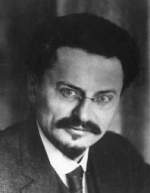
Birth: Leon Trotsky: Russian revolutionary leader, writer: Diary in Exile, among much else.
1885 Birth: Niels Bohr--in Copenhagen, Denmark: [Bohr] went on to become an accomplished physicist who came up with a revolutionary theory on atomic structures and radiation emission. He won the 1922 Nobel Prize in physics for his ideas and years later, after working on the Manhattan Project in the United States, called for responsible and peaceful applications of atomic energy across the world. [For further information, click here.]
1900 Birth: Heinrich Himmler:German Nazi leader:
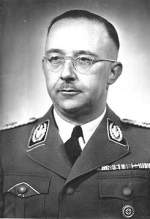
An early member of the National Socialist German Workers' (Nazi) party, Himmler took part in Adolf Hitler's "beer-hall putsch" of 1923, and in 1929 Hitler appointed him head of the SS, or Schutzstaffel, the party's black-shirted elite corps. When Hitler came to power he made Himmler head of police in Munich and then chief of the political police throughout Bavaria. After the party purge of June, 1934, which eliminated Ernst Roehm, head of the SA, or Nazi militia, Himmler's SS became the major police organ of the state.
In 1936, Himmler was named chief of the German police; this brought him formal control over the Gestapo, the secret police that had been set up in 1933 by Hermann Goering. From his preeminent position Himmler terrorized his own party hierarchy as well as all German-held Europe, establishing and overseeing concentration camps and ordering incarceration and death for millions, particularly after the beginning of World War II. A superb bureaucrat and one of the most cold-blooded of the Nazi leaders, he was a fanatic racist. In Aug., 1943, he became minister of the interior, and after putting down the conspiracy against Hitler in July, 1944, he was the virtual dictator of German domestic policy.
In April, 1945, just before Germany's defeat in World War II, Himmler secretly attempted to negotiate German surrender, hoping to save himself. Upon hearing of this, Hitler expelled him from the party. Himmler attempted to escape, but was arrested by British troops in May, 1945, and committed suicide by swallowing poison.
1908 Crete revolts against Turkey and aligns itself with Greece:
When the Young Turk Rebellion in Istanbul changed matters in the Ottoman Empire, the Cretan parliament again proclaimed unification with Greece; Eleftherios Venizelos headed a commission which was to rule Crete until unification was achieved (1908; internationally recognized only in 1913). Italy had long opposed the unification of Crete with Greece, as did the Ottoman Empire. The Protecting Powers withdrew their troops in July 1909. In 1909-1910, tension over the status of Crete was such that the powers contemplated the reoccupation of the island.
1913 Moving Assembly Line at Ford:

For the first time, Henry Ford’s entire Highland Park, Michigan automobile factory is run on a continuously moving assembly line when the chassis–the automobile’s frame–is assembled using the revolutionary industrial technique. A motor and rope pulled the chassis past workers and parts on the factory floor, cutting the man-hours required to complete one “Model T” from 12-1/2 hours to six. Within a year, further assembly line improvements reduced the time required to 93 man-minutes. The staggering increase in productivity effected by Ford’s use of the moving assembly line allowed him to drastically reduce the cost of the Model T, thereby accomplishing his dream of making the car affordable to ordinary consumers. [For further information, click here.]
1914 World War I: Various:

List Regiment: Infantry recruit Adolf Hitler bids farewell to the family of the Munich tailor, Josef Popp, with whom he was recently a boarder. Hitler requests that, in the event of his death, the Popp family should write to his sister on his behalf and suggest that she might perhaps like to receive his few possessions. He tells the Popps that, if she does not, then they can have them. Frau Popp cries, as Hitler hugs her two children goodbye. After shaking hands with Josef, he sets off for his "great adventure." [For further details, Click here.]
Antwerp under siege: Advancing German forces bombard the Belgian city of Antwerp, as Belgian troops and their British allies struggle to resist the onslaught.
[For further details, Click here]
1915 World War I: Various:
From The Fall of Serbia by Erich von Falkenhayn:
While the great battle in France was developing and raging, the deployment and preparations for attack in South Hungary pursued their allotted course. Instead of the one division that was to come from France, another that was on its way from Russia to the West was diverted to the South-East. That was the sum total of the influence on the Serbian campaign of all that the English and French had sacrificed in the West. In the course of the month of September, the Serbian bank was repeatedly shelled for purposes of deception, without any further steps being taken, but on the 6th October the bombardment preparatory to the real crossing was begun, the crossing following on the 7th. The Third Austro-Hungarian Army crossed on the line Kupinovo-Belgrade, and the left half of our Eleventh Army at Ram, the right following on the next day.
List Regiment (Oct 7 - 14):
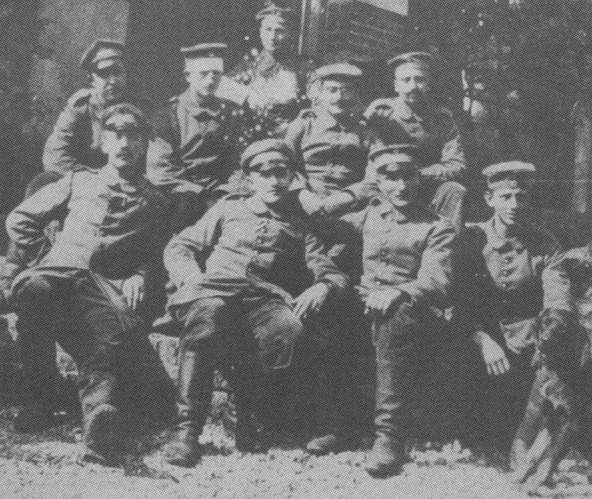
Gefreiter Adolf Hitler's serves with 16 Reserve Infantry Regiment at Fromelles. [For further details, Click here.]
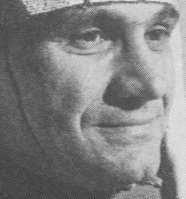
Captain Frederick 'Fritz' Wiedemann is seeking volunteers during an intense rolling artillery barrage, but "nobody dared to poke his head above a shell-hole necessarily, let alone voluntarily put his life at risk. Then Hitler stepped forward, as had happened so often in the past. The tireless Hitler and Schmidt set out for the second time—Schmidt came back alone. We were all deeply shaken when we heard that Hitler had been wounded . . . . He lay out at the Front wallowing in his own blood, shot through the left leg.
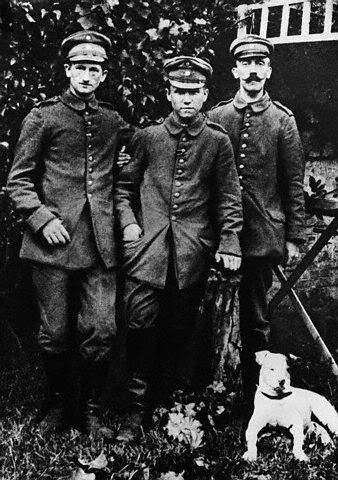
Schmidt, Amann, Hitler, Fuchsl]
"It's not so bad, captain, right? I'll stay with you? Stay with the regiment?" There he lay, the man who so badly wanted to be an artist, who loved all newspapers, who philosophized about political and ideological questions in the primitive manner of ordinary people. There he lay, wounded, and had no other wish than to be allowed to stay with his regiment. He had no family and also, if one might say, no homeland. For Gefreiter Hitler the List Regiment was home.
From Adolf Hitler's Mein Kampf:Even in the early stages of the war the soldiers were sometimes prone to complain; but such criticism was confined to "internal affairs". The man who at one moment groused and grumbled ceased his murmur after a few moments and went about his duty silently, as if everything were in order. The company which had given signs of discontent a moment earlier hung on now to its bit of trench, defending it tooth and nail, as if Germany's fate depended on these few hundred yards of mud and shell-holes. The glorious old army was still at its post. A sudden change in my own fortunes soon placed me in a position where I had first-hand experience of the contrast between this old army and the home front. At the end of September 1916 my division was sent into the Battle of the Somme. For us this was the first of a series of heavy engagements, and the impression created was that of a veritable inferno, rather than war. Through weeks of incessant artillery bombardment we stood firm, at times ceding a little ground but then taking it back again, and never giving way. On October 7th, 1916, I was wounded but had the luck of being able to get back to our lines and was then ordered to be sent by ambulance train to Germany. [For further details, Click here.]
1917 World War I (Sep 30-Oct 17):
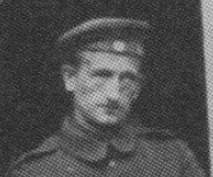
Hitler continues an eighteen-day furlough to accompany Schmidt [above] on a visit to his sister in Dresden with him. After sightseeing stops at Brussels and Cologne, they hit Leipzig, a city Hitler especially enjoys. He is impressed by the 300-foot tall monument, Battle of the Nations, honoring the war-dead of 1812. "This has nothing to do with art," he tells Schmidt (above), "but it is enormous and beautiful." After spending some time with Schmidt in Dresden, Hitler goes off by himself to Berlin to spend a few days with yet another front-line comrade. In a postcard to Schmidt, he writes: "The city is marvelous. A real world capital. Traffic is still tremendous. Am gone almost all day. Now finally have opportunity to study the museums a little better. In short: there is nothing lacking." [For further details, Click here.]
1918 World War I (Sep 28-Oct 15):
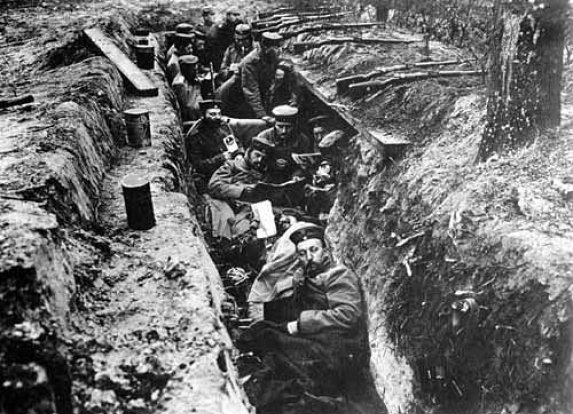
Gefreiter Adolf Hitler participates in defensive operations in Flanders with 3 Company, 16 Bavarian Reserve Infantry Regiment. [For further details, Click here.]
1919 Aviation: KLM, the oldest airline in the world still operating under its original name, is founded. [For further information, click here.]
1934 Spanish Civil War: Armed revolts in Spain are led by both the Socialist-Anarchists-Communists and the Catalonian Separatists. (THP)
1938 Various:
Slovakia and Transcarpathian Ruthenia are granted autonomy by the Germans from what is left of Czechoslovakia.
Holocaust: Italy: The Fascist Grand Council bans the Jewish method of slaughtering animals.
The Jewish religious tradition forbids causing animals unnecessary pain. And there are observant Jews who are vegetarians; our tradition even teaches that the first man and woman—indeed all of humanity until Noah—were divinely forbidden to eat meat. But the Jewish faith expressly permits the killing of animals for human needs, including food. Which animals may be eaten and how to dispatch them are topics dealt with at considerable length in Jewish legal literature.
Church and Reich: Hitler Youth attack the Bishop's Palace in Vienna.
1939 Various:

World War II: Reich Foreign Minister (Ribbentrop) to German Ambassador in the Soviet Union (Schulenburg):
I am receiving reliable reports from Istanbul to the effect that Russo-Turkish negotiations might yet lead to the signing of a mutual assistance pact. Hence I request you to call on Herr Molotov immediately and to emphasize strongly once more how much we would regret it if the Soviet Government were unable to dissuade Turkey from concluding a treaty with England and France or to induce her to adopt all unequivocal neutrality. In the event that the Soviet Government itself cannot avoid concluding a mutual assistance pact with Turkey, we would regard it as a foregone conclusion that she would make a reservation in the pact whereby the pact would not obligate the Soviet Government to any kind of assistance aimed directly or indirectly against Germany.
Indeed, Stalin himself promised this. Without such a reservation, the Soviet Government, as has been previously stressed, would commit an outright breach of the Non-aggression Pact concluded with Germany. It would, moreover, not suffice to make this reservation only tacitly or confidentially. On the contrary, we must insist that it be formally stipulated in such a manner that the public will notice it. Otherwise a very undesirable impression would be created on the public, and such an act would be apt to shake the confidence of the German public in the effectiveness of the new German-Russian agreements.
Please take this opportunity to inform yourself on the other details concerning the status of the Russo-Turkish negotiations and to find out what is to be agreed upon between the two Governments in regard to the question of the Straits. Report by wire. Reich Foreign Minister.
Note: I communicated the contents of this instruction to Count Schulenburg this afternoon by telephone. The transmission was very good. Count Schulenburg said he had just come from Molotov, who had told him that he had not talked with the Turkish delegation since Sunday. Hence our warning certainly arrived in time. I replied that Count Schulenburg should nevertheless lose no time, as it was a matter of decisive importance, and the reports received here pointed to a rather advanced stage in the negotiations. Accordingly, Count Schulenburg is to call on Molotov again tomorrow morning.
[See: Worst Dictator of Modern Times: Hitler or Stalin?]World War II: Press Reaction to Hitler's October 7 Speech:
Those who had expected Hitler to make the dramatic gesture yesterday of announcing his resignation to the Reichstag were not successful prophets. He did not announce his resignation. Instead he asked by implication for the resignation of Mr. Chamberlain and M. Daladier. (New York Times)
Heinrich Himmler celebrates his birthday by issuing a decree giving him a new title: Reich Commissar for the Strengthening of the German People (RFV). (THP)
1940 World War II: Various:
German troops enter Romania:
On this day in 1940, Hitler occupies Romania as part of his strategy of creating an unbroken Eastern front to menace the Soviet Union.
As early as 1937, Romania had come under the control of a fascist government that bore great resemblance to that of Germany's, including similar anti-Jewish laws. Romania's king, Carol II, dissolved the government a year later because of a failing economy and installed Romania's Orthodox Patriarch as prime minister. But the Patriarch's death and a peasant uprising provoked renewed agitation by the fascist Iron Guard paramilitary organization, which sought to impose order. In June 1940, the Soviet Union co-opted two Romanian provinces, and the king searched for an ally to help protect it and appease the far right within its own borders. So on July 5, 1940, Romania allied itself with Nazi Germany-only to be invaded by its "ally" as part of Hitler's strategy to create one huge eastern front against the Soviet Union.
King Carol abdicated on September 6, 1940, leaving the country in the control of fascist Prime Minister Ion Antonescu and the Iron Guard. While Romania would recapture the territory lost to the Soviet Union when the Germans invaded Russia, it would also have to endure the Germans' raping its resources as part of the Nazi war effort. Nevertheless, with German troops now occupying his nation, Antonescu would go on to sign the Tripartite (Axis) Pact in November, tying Romania to the military machinations of not only Germany, but Italy and Japan as well. (History.com)
Holocaust: The Germans order all Jews in occupied France to register immediately with its authorities.1941 Various: World War II:
Barbarossa: On the central and southern fronts, German forces capture Wjasma, Berdjansk and Mariupol.
Finland rejects a British demand to cease fighting the Soviet Union.
Barbarossa: From a top secret order of the Supreme Command of the Armed Forces signed by Alfred Jodl: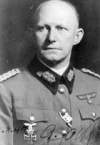
The Fuehrer has again decided that a capitulation of Leningrad or, later, of Moscow is not to be accepted even if it is offered by the enemy . . . . Therefore, no German soldier is to enter these cities. By our fire we must force all who try to leave the city through our lines to turn back. The exodus of the population through the smaller, unguarded gaps toward the interior of Russia is only to be welcomed. Before the cities are taken, they are to be weakened by artillery fire and air attacks, and their population should be caused to flee. We cannot take the responsibility of endangering our soldiers' lives in order to save Russian cities from fire, nor that of feeding the population of these cities at the expense of the German homeland . . . . All commanding officers shall be informed of this will of the Fuehrer.
[See: What Were Adolf Hitler's Major Blunders?]1942 World War II: Stalin to FDR:

The difficulties of delivery are reported to be due primarily to shortage of shipping. To remedy the shipping situation the Soviet Government would be prepared to agree to a certain curtailment of US arms deliveries to the Soviet Union. We should be prepared temporarily fully to renounce deliveries of tanks, guns, ammunition, pistols, etc. At the same time, however, we are badly in need of increased deliveries of modern fighter aircraft--such as Aircobras--and certain other supplies. It should be borne in mind that the Kittyhawk is no match for the modern German fighter. It would be very good if the USA could ensure the monthly delivery of at least the following items: 500 fighters, 8,000 to 10,000 trucks, 5,000 tons of aluminum, and 4,000 to 5,000 tons of explosives. Besides, we need, within 12 months, two million tons of grain (wheat) and as much as we can have of fats, concentrated foods and canned meat. We could bring in a considerable part of the food supplies in Soviet ships via Vladivostok if the USA consented to turnover to the USSR 20 to 30 ships at the least to replenish our fleet. I have talked this over with Mr. Willkie, feeling certain that he will convey it to you. As regards the situation at the front, you are undoubtedly aware that in recent months our position in the South, particularly I the Stalingrad area, has deteriorated due to shortage of aircraft, mostly fighters. The Germans have bigger stocks of aircraft than we anticipated. In the South they have at least twofold superiority in the air, which makes it impossible for us to protect our troops. War experience has shown that the bravest troops are helpless unless protected against air attack.
1943 World War II: Various:
From Operation Order Atlantic Number 56:
Rescue ships: A so-called rescue ship is generally attached to every convoy, a special ship of up to 3,000 gross registered tons, which is intended for the picking up of survivors after U-boat attacks. These ships are for the most part equipped with a shipborne aircraft and large motorboats, are strongly armed with depth charge throwers, and are very maneuverable, so that they are often taken for U-boat traps by the commander . . . . In view of the desired destruction of ships' crews, their sinking is of great value.
War with Japan: Japanese execute nearly 100 American prisoners on Wake Island:
Rear Adm. Shigematsu Sakaibara, commander of the Japanese garrison on the island, orders the execution of 96 Americans POWs, claiming they were trying to make radio contact with U.S. forces.
In late December 1941, the Japanese reinforced existing forces on Wake Island, part of a coral atoll west of Hawaii, in massive numbers after being unable to wrest the island from a small number of Americans troops earlier in the month. The Japanese strength was now overwhelming, and most of those Americans left alive after the battle were taken by the Japanese off the island to POW camps elsewhere. Ninety-six remained behind to be used as forced labor. The Allied response was periodic bombing of the island--but no more land invasions, as part of a larger Allied strategy to leave certain Japanese-occupied islands in the South Pacific to basically starve in isolation.
The execution of those remaining American POWs, who were blindfolded and shot in cold blood, remains one of the more brutal episodes of the war in the Pacific. (History.com)
1944 Various:
World War II: Finland: On the Karelian front in northern Finland, 20th Gebirgsarmee (Schoerner) retreats in the face of strong Soviet attacks.
Holocaust: Jewish revolt at Auschwitz: Recently arrived Jews from Poland, Hungary and Greece, who are being forced to drag bodies from the gas chambers to the crematoria, having secretly obtain explosives from four Jewish girls working in a nearby munitions factory, blow up one of the four crematoria. All are killed, except for one man, who later starves to death at Ebensee. (THP)
[See: Was the Holocaust Detrimental to Hitler's War Effort?]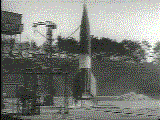
1947: Can V-2 Be Improved by David A. Anderton.
[See: Wunderwaffen: Hitler's Deception and the History of Rocketry.]1949 East Germany created:
Less than five months after Great Britain, the United States, and France established the Federal Republic of Germany in West Germany, the Democratic Republic of Germany is proclaimed within the Soviet occupation zone. Criticized by the West as an un-autonomous Soviet creation, Wilhelm Pieck was named East Germany's first president, with Otto Grotewohl as prime minister.
Approximately half the size of West Germany, East Germany consisted of the German states of Mecklenburg, Brandenburg, Lusatia, Saxony, and Thuringia. Berlin, the former German capital, remained divided between West and East German authorities, even though it was situated deep within the communist Democratic Republic of Germany. East Germany ceased to exist in 1990, when its land and people were absorbed into the democratic Federal Republic of Germany. (History.com)
1963 Nuclear weapons: President John F. Kennedy signs documents of ratification for a nuclear test ban treaty with the UK and the Soviet Union.
1976 PRC: Hua Guofeng succeeds Mao Zedong as Chairman of the Communist Party of China. [For further information, click here.]
1981 Egypt: Parliament appoints Vice President Hosni Mubarak as successor to the assassinated Anwar Sadat.
1985 Terrorism: Four members of the PLO hijack the Italian cruise ship Achille Lauro and demand the release of Palestinian prisoners held in Israel. Egyptian President Hosni Mubarak eventually persuades the hijackers to surrender, but not before they kill a wheelchair-bound Jewish passenger from the United States, named Leon Klinghoffer, and dump his body overboard. [For further information, click here.]
1988 Baltic: The Latvian flag is raised in Riga for first time since annexation by the USSR.
1989 East Germany celebrates its 40th anniversary as a communist state amid pro-reform demonstrations.
2001 War on Terrorism: The War in Afghanistan begins with an aerial bombing campaign targeting Taliban and Al-Qaeda forces. [For further information, click here.]
Edited by Levi Bookin (Copy editor)
levi.bookin@gmail.com



Click to join 3rdReichStudies



Disclaimer: This site includes diverse and controversial materials--such as excerpts from the writings of racists and anti-Semites--so that its readers can learn the nature and extent of hate and anti-Semitic discourse. It is our sincere belief that only the informed citizen can prevail over the ignorance of Racialist "thought." Far from approving these writings, this site condemns racism in all of its forms and manifestations.
Fair Use Notice: This site may contain copyrighted material the use of which has not always been specifically authorized by the copyright owner. We are making such material available in our efforts to advance understanding of historical, political, human rights, economic, democracy, scientific, environmental, and social justice issues, etc. We believe this constitutes a "fair use" of any such copyrighted material as provided for in section 107 of the US Copyright Law. In accordance with Title 17 U.S.C. Section 107, the material on this site is distributed without profit to those who have expressed a prior interest in receiving the included information for research and educational purposes. If you wish to use copyrighted material from this site for purposes of your own that go beyond 'fair use', you must obtain permission from the copyright owner.
Please Note: The list-owner and moderators of 3rdReichStudies are not responsible for, and do not necessarily approve of, the random ads placed on our pages by our web server. They are, unfortunately, the price one pays for a 'free' website.